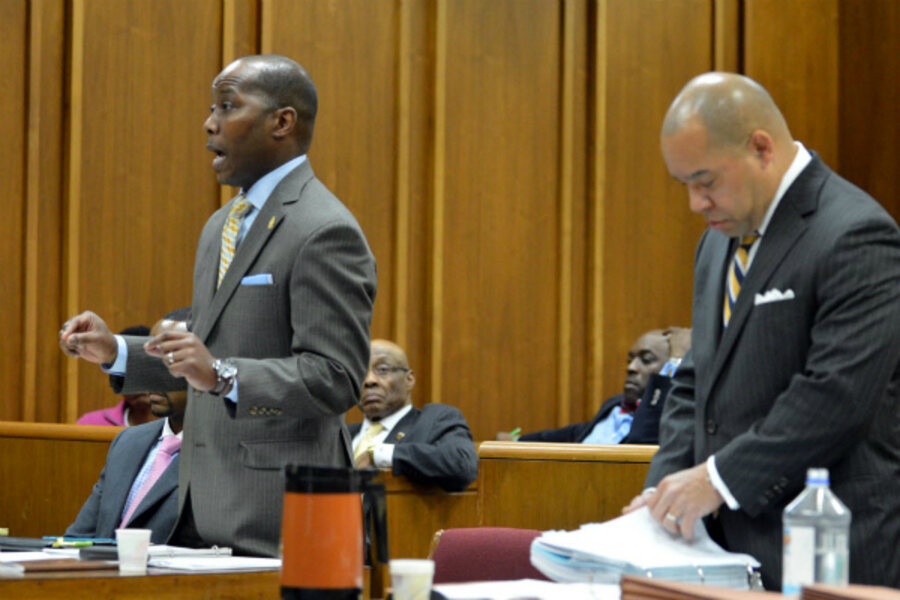Court to seize MLK's Nobel Prize and 'sacred' Bible – if they can be found
Loading...
| ATLANTA
The long-simmering feud between the children of civil rights legend the Rev. Martin Luther King Jr. reached new heights late Wednesday, when a Fulton County Superior Court judge in Georgia ordered the Rev. Dr. King’s 1964 Nobel Prize and his well-worn “traveling” Bible, used to swear President Obama into office last year, to be placed in a bank lockbox.
Judge Robert McBurney said he himself will keep the key to the lockbox, a move that takes King’s most prized possessions out of private hands and into public safekeeping, until a final determination is made about what will be done with them. Some King children are prepared to sell the items, while others want them to stay in the family.
At issue in the lawsuit is the extent of the public’s interest in the items, especially the Bible, which Mr. Obama signed after swearing his oath of office upon it during his second inauguration.
“You don’t sell the Coke recipe,” said Judge McBurney, referencing another Atlanta icon. “I understand the public’s interest in these items, that these are cultural relics, not just for the United States but internationally. I did not mean to trivialize this by comparing it to the Coke recipe. I recognize there’s uniquely a public interest with the Bible.”
Brothers Dexter King and Martin Luther King III want to sell the items to an interested buyer to keep the family’s nonprofit organization, the Martin Luther King, Jr. Center for Nonviolent Change, financially viable.
Their younger sister, Bernice, has said the items are “sacred” and should not be sold. Auction experts say they could go for more than $10 million, which an original US Constitution once owned by George Washington fetched last year.
King, known for his “Letters from a Birmingham Jail,” the march from Selma, and his “I Have a Dream” speech on the Mall in Washington, has become part of the national iconography, including a new MLK monument in Washington.
Yet the King family has over the years held tight to King as a private copyright, charging fees for the use of his speeches and name. Meanwhile, internecine feuds have fractured the family as they’ve squabbled over money and power within the King estate.
The tension between King’s name and the public’s interest is a flash point in the current trial.
“They keep throwing out the fact that Dr. King was a private citizen – that’s why his image is protected,” Harry Johnson, a fundraiser for the Martin Luther King Jr. Memorial who has deep knowledge of the King family, told Emerge editor George Curry in 2011.
He added: “At what point does one stop becoming a private citizen? Is that when we named a holiday after him? Or is it when we put a memorial on the Mall of him next to the other icons of this country?”
In response to Wednesday’s ruling, civil rights leader C.T. Vivian told Maria Saporta, of Atlanta’s Saporta Report, that “the important party here is the public.”
Philanthropists have already contributed in a big way to keep other parts of King’s estate out of private hands.
Former Atlanta Mayor Shirley Franklin helped to raise $32 million in 2006 to keep King’s private papers off the auction block. (They are now stored at Morehouse College, a historically black college in Atlanta.)
On the other hand, it’s not unusual for descendants of famous men and women to sell off their relatives' relics to private buyers. Such sales are often to the public’s benefit, as many benefactors loan or even deed items to museums and other public institutions.
With McBurney’s ruling, the more immediate question now becomes: Where are the MLK Bible and the Nobel medal, and will Ms. King give them up?
In their lawsuit, the brothers contend that their sister has “sequestered” the items in a secret place. Earlier this month, Ms. King told Forbes’s Nathan Raab that her brothers know where the items are.
“They have pretty much been in the same location for several years,” Ms. King told Forbes. “The Bible as you know at one point … was on display at the King Center before President Obama requested the use of daddy’s Bible, or should I say one of his Bibles…. It was actually signed by President Obama either the day of or the day after the Inauguration and returned to Atlanta. Obviously it was not put back on display at that particular time.”
Ms. King’s lawyers said they are debating whether to turn over the items.








